So-Dominguez and Rapport-Wojtaszek to battle in out in the playoffs
IM Michael Rahal – Berlin, February 10th 2022 – The final round of the qualifying stage was without any doubt the most exciting chess witnessed in Berlin during the last few days. With a lot at stake, all the games (with the exception of Aronian – Dubov) were fought to the bitter end.

The ceremonial first move was executed by Richard Lutz, CEO of Deutsche Bahn (German Railways). Mr. Lutz is a strong player himself, and Deutsche Bahn has been a regular supporter of chess in Germany over the years. He opened the game for Vidit with 1.c4 against local player Vincent Keymer, and the games were on!
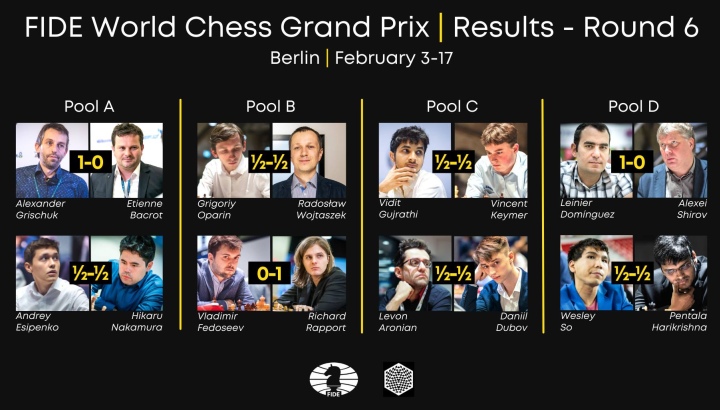
Pool A
In a must-win scenario, Andrey Esipenko opened with 1.e4 against Hikaru Nakamura. A draw would be enough for the American, so he went back to the solid 1…e5, his main option for the last few years.
Esipenko chose the Italian Opening, and both players more or less blitzed out their opening moves, following a previous 2019 game between Alekseenko and Grischuk.
The Russian could have won a pawn with 14.Bxa6 – a move he considered for nearly 15 minutes – but instead, he preferred to advance in the center. With 16.d5, he closed the position and went for a structure resembling the King’s Indian defence: for that reason, as soon as he got the chance, Nakamura lashed out with the typical counter 21…f5.
Esipenko took over the initiative and firmly wedged his pawn to e6, achieving a decisive advantage. But in the time scramble, he missed several winning opportunities, allowing Nakamura to escape unscathed into a slightly worse queen ending which he was able to hold to a draw.
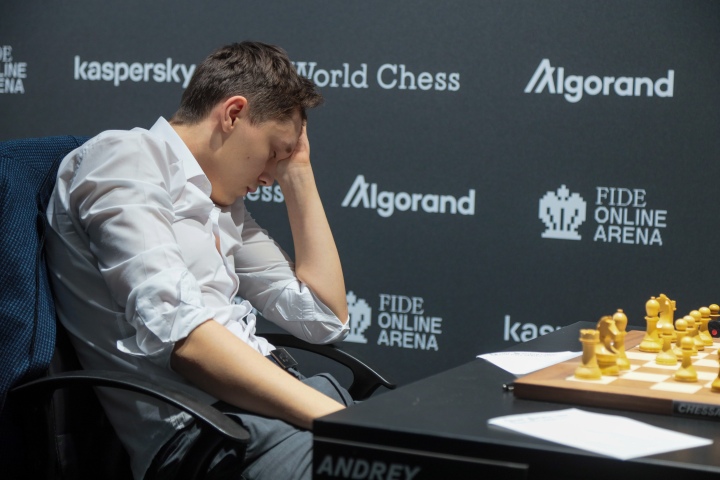
In his postgame interview with FIDE Press Officer IM Michael Rahal, a visibly relieved Hikaru Nakamura gave his take on the game: “In the opening I got very creative, mixing up a bunch of plans. I thought I was worse, and Andrey played very well. Just when I thought I was fine I blundered with Kh7, and I was close to resigning”.
Although all eyes were on the Esipenko-Nakamura game, next to them, Alexander Grischuk and Etienne Bacrot were fighting it out to avoid last place. Bacrot left his French defence at home and brought out the classical variation of the Sicilian defence.
Possibly suspecting this, Grischuk followed the 2021 game between Anish Giri and Maxime Vachier-Lagrave (MVL is coached by Bacrot) but Etienne deviated with the novelty 15…Qc5, offering the exchange of queens, which Grischuk declined. The online commentators were slightly worried that Bacrot was risking too much by leaving his king in the center of the board, with so many heavy pieces surrounding it, but this is the well-known strategy in the variation.

The Frenchman missed a huge winning opportunity on move twenty: facing an attack on his queen, Bacrot instantly moved it away with 20…Qb6. However, the unbelievable tactic 20…Nxe4! would have led to a winning position, in view of 21.Nxe4 Bxe4! 22.Rxc5 dxc5 23.Qe1 Rxd1 24.Qxd1 Rxh2 followed by 25…Rh1 winning. As soon as this idea was voiced in the postgame conference, Alexander immediately saw the whole line in his head.
Grischuk didn’t allow a second chance and struck back with a classic Sicilian knight sacrifice on d5, opening the game for his pieces and achieving a winning attack. Although he missed some opportunities to finish the game – among other things because Bacrot was huge in defence – in the end, he got the job done.
Pool B
In the first game, Grigoriy Oparin chose an enterprising but risky variation of the Reti opening, winning a pawn but falling behind heavily in development. Radoslaw Wojtaszek took up the gauntlet and began to centralize his pieces – a win would give him excellent chances to take clear first.
The precise 18….Nd3+ installed a strong pawn on d3 and was the prelude to a kingside offensive. In addition to his precarious position, Oparin was dangerously falling behind on the clock.
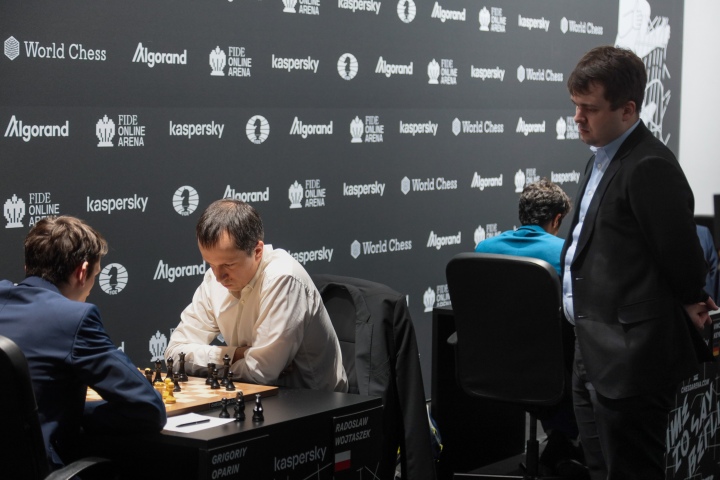
When everything seemed to be on point for Poland’s number two, a couple of inaccurate moves allowed Oparin to exchange queens and with a daring exchange sacrifice, he took over the imitative and forced a three-fold move repetition draw.
In the postgame interview, Radek lamented his missed opportunities: “I was sure that I was winning at some moment, but I had to play the correct moves, and I failed”. Asked about improvement ideas for his participation in the third leg, Oparin was very clear: “I have played so badly here that I have many things to improve, tactics, openings, and recover my best form”.
Meanwhile, with Black against Vladimir Fedoseev, Richard Rapport was doing his best to unbalance the position. His opening choice was already a sign of intent: the offbeat Chigorin defence. Fedoseev played it safe with the solid 3.Bf4 line and again, Rapport chose to unbalance the pawn structure by recapturing 6…cxd6, doubling a pawn, but avoiding symmetry at all cost.
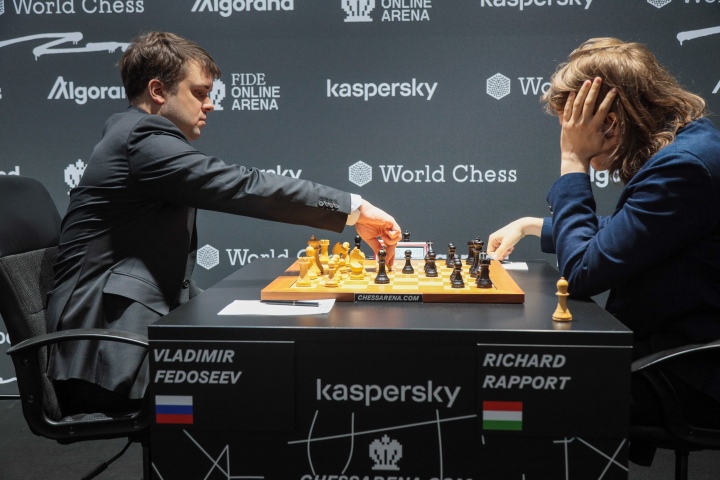
However, Fedoseev kept his calm, opened the position and initiated exchanges on the c-file. It seemed that the Russian missed a good chance to achieve an advantage on move twenty-two: instead of 22.Re1, the computer was blasting out 22.e4!
The position remained balanced, and Fedoseev did have a chance to claim a three-fold move repetition which he declined. Possibly not the best decision as after the queen exchange, Rapport took over and, with excellent endgame technique, outplayed his opponent.
In an incredible turn of events, Richard Rapport will now face Radoslaw Wojtaszek for a place in the semifinals. The winner of tomorrow’s playoffs will play against Hikaru Nakamura.
Pool C
The first game to finish was a quick draw between Levon Aronian and Daniil Dubov. Although hardly fifteen minutes went by from the beginning of the round, Aronian had an explanation ready: “I wasn’t expecting this line, so when Daniil played 8…Nbd7, I remembered my analysis, which was a long and very sharp line”.

Aronian continued: “I thought that he would be well prepared as this is not his usual opening repertoire, and I just thought that a draw is a normal result against a good player. Also, as this is preliminary, it’s only logical to get more rest before the tough semifinal.”
What at first sight might seem a formality, the game between Vidit Gujrathi and Vincent Keymer was all guns blazing. A few thousand euros plus some extra Grand Prix points were in play, and Vidit was clearly going to try and win to take second place in the group.
Following the 9th game of the 2021 World Championship between Carlsen and Nepomniachtchi, the opening was a Neo-Catalan, although most theoreticians prefer to consider it as a Benoni with reversed colours. It seemed that White was slightly better going into the middlegame – some extra space and pawn center, but these positions are hard to assess: it looks good for White, but the computer keeps the balance with precise play.
It’s always hard to speculate when commentating these elite games, but maybe 28.g4 was inaccurate (28.Ra1 instead seemed like a better try). As played, Keymer managed exchange White’s strong knight on e5 and the game headed to a draw.
Pool D
Trailing So by half point and having White, the only realistic outcome for Lenier Dominguez was to go hard for a win against Alexei Shirov and hope that Wesley would be unable to defeat Harikrishna. Lenier opted for the Italian Opening, very popular these days, and his opponent spiced things up with the aggressive 6…g5.

However, Dominguez came very well prepared, following a recent 2021 game between two American players, and achieved a small edge out of the opening. Shirov defended very well, simplifying into a slightly worse but defendable endgame. However, as Shirov explained in the postgame interview, his moves Re2 and Rb2 were not the way to go in the endgame.
Dominguez increased the pressure and notched up one of the most important wins of his career. He will now face Wesley So in tomorrow’s playoff: “It’s obviously very tough for both. Wesley is always very solid, very strong, especially in rapid time controls. I will fight, and we’ll see what happens”, were his thoughts immediately after the game.
In the other game, Wesley So faced a tricky situation. With White against Harikrishna, a draw would suffice as long as Dominguez didn’t defeat Shirov. A solid Catalan Opening seemed quite a decent solution: try to achieve a small edge and keep pressing.
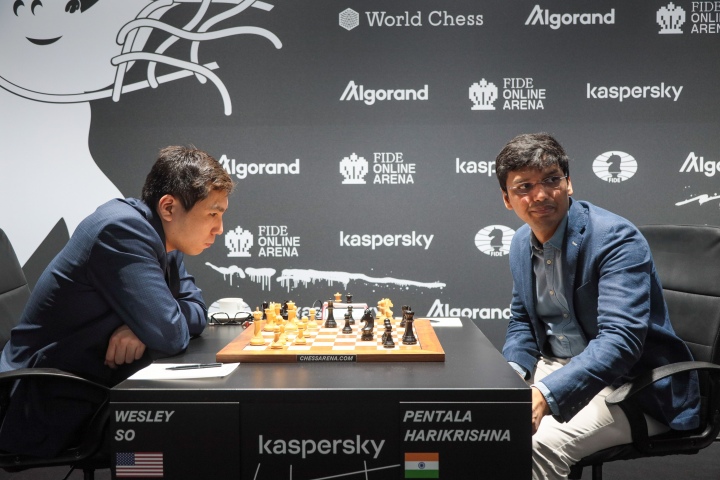
Harikrishna defended with precision over many moves, but at some point, he had to give up the c-file and overextend his pawn center. It seemed that So was going to score a win, but, low on time, he went after the a-pawn allowing his opponent a lot of tactical counterplay on his first rank. Harikrishna eventually got a draw after So forced the perpetual.
In his postgame interview, So lamented his missed opportunities but at the same time praised his opponent’s opening preparation and resilience. “I was very happy to see 28…e4 on the board when I had options like Bh3, Qe5, Rc7, but I think I chose wrongly with 29.a4 and after that did not have many chances.”
With these results, Wesley So will playoff against Leinier Dominguez for the chance to face Levon Aronian in one of the semifinals, while Radoslaw Wojtaszek will face off against Richard Rapport. The winner of this match will play against Hikaru Nakamura. Both Nakamura and Aronian will enjoy one extra rest day.
The playoffs will be held tomorrow afternoon at 3 pm in the tournament venue. Two rapid chess games with a 15 minute + 10 second time control will be played. If scores are level after these games, then two 3 minutes + 2 seconds games will follow. If the match is still level, a sudden death (“Armageddon”) will be played to decide a winner.
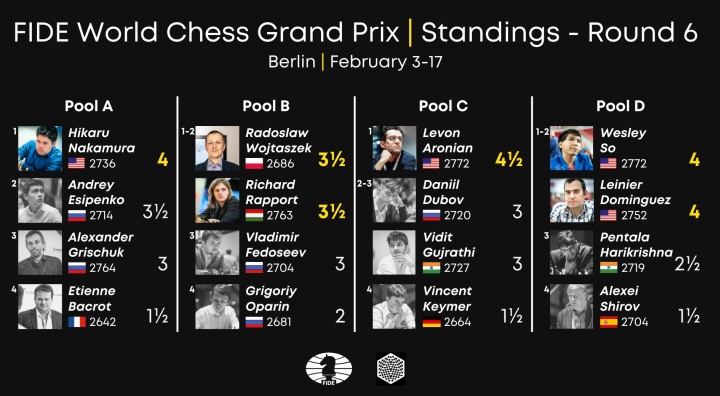
About the Tournament
The three-tournament Grand Prix series, which will unfold from February to April, features twenty-four of the world’s best Grandmasters, who will compete in two of the three events. In order to make the series more exciting and reduce the percentage of draws, FIDE and World Chess have changed the format.
This innovative approach is new for the chess world but very similar to the Super League: the first stage has four pools of four players, and the winner of each pool advances to the semifinals and then to the final.
The venue of the first leg is the World Chess Club Berlin, located at the City Centre on Unter den Linden, 26-30, and the games will be played from February 4th-17th every afternoon at 3 pm. Along with the two qualification spots for the Candidates, the event has a 150.000 euros prize fund, 20.000 euros more than the 2019 series.
All the games will be broadcasted live with expert commentary in three languages at https://chessarena.com/broadcasts/13604 More information and the full schedule can also be found on the worldchess.com website. Full pairings can be found here.
Due to COVID restrictions currently in place, only a limited number of tickets are available. Please note that the 2G+ rule applies to the event, which means that visiting the venue is only possible for those who either have a complete vaccination with EU-certified vaccine or proof of recovery and can additionally present a booster dose certificate or a negative test result.
Leading companies supporting the FIDE Grand Prix Series 2022 include:
Kaspersky as the Official Cybersecurity Partner
Algorand as the Official Blockchain Partner
Prytek as the Technology Transfer Partner
FIDE Online Arena as the official Partner
For further questions, please contact: media@worldchess.com
Text: IM Michael Rahal







